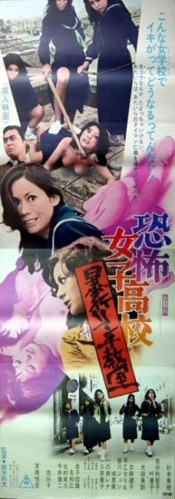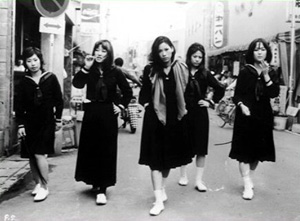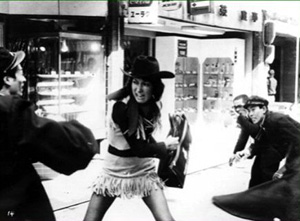By 1973, the Pinky Violence genre was in full swing; the Stray Cat Rock and Delinquent Girl Boss series had run their course, and the Female Prisoner Scorpion and Girl Boss series were in full swing. With so many films and themes  already explored, how do you keep your audience? Ramp up the exploitive elements, that’s how! And that’s exactly what Toei did in Norifumi Suzuki’s Terrifying Girls High School: Lynch Law Classroom, the second (and arguably nastiest) entry in the Terrifying Girls High School series. Those that can look past the unashamedly risqué elements however will find something quite interesting just beneath the surface.
already explored, how do you keep your audience? Ramp up the exploitive elements, that’s how! And that’s exactly what Toei did in Norifumi Suzuki’s Terrifying Girls High School: Lynch Law Classroom, the second (and arguably nastiest) entry in the Terrifying Girls High School series. Those that can look past the unashamedly risqué elements however will find something quite interesting just beneath the surface.
Setting the tone for what’s to come, the film opens with a group of school girls, wearing red surgical masks and gloves, torturing one of their hapless classmates named Michiyo Akiyama. They appear to be draining her of her blood through an IV, and tell her that once the blood reaches a certain level in the flask, she’ll die due to extreme blood loss. This is all a cruel trick though, as a girl in the background is actually pumping the blood into the flask through a large syringe. Unaware of this illusion, and getting quite scared as the blood rises near to the fatal level, Michiyo breaks free and struggles with the girls, escaping to the roof of the building. Eventually, she’s forced over the side of the building and falls to her death.
Shockingly, this is all taking place in a school, one that’s ironically named “The School of Hope for Girls”. It’s run by a local politician, Shigeru Sato, and is meant to take in delinquent girls and teach them manners; their motto is “To raise good wives and wise mothers”. The school was opened upon the end of World War II, feeling that this establishment was something that the nation needed. It’s quickly realized that nearly everyone involved in running the school could not care less about truly reforming the girls and running a respectable organization; it’s really just something they’re into to make themselves look good in the eyes of the public. In fact, the murder that opens the film is completely covered up by the higher-ups at the school, and reported as an accident. The girls that were involved are strangely enough the schools “Disciplinary Committee”, and are given full reign to keep any rebellious girls in check, by any means necessary.
Unfortunately for the girls of the Disciplinary Committee, a trio of rebels not well versed in following the rules are about to be transferred to the school: Noriko “The Boss with the Cross” Kazama (Miki Sugimoto), “Razor-Blade” Remi Kitano (Misuzu Ota), and Kyoko “Sappho” Kubo (Seiko Saburi). All of them find trouble before even arriving, with Noriko trying to steal a car to get there, Remi getting into a scrap with a group of street thugs, and Kyoko hitching a ride with a truck driver, only to pay him for the ride via a hand job and causing him to have an accident…right in front a police station.
Once the three girls are delivered to the school, they’re quickly backed by many of the other students, who are terrorized daily by the Disciplinary Committee and the corrupt staff. In a twist of fate, Michiyo, the girl killed at the opening of the film, was Noriko’s right-hand lady and best friend, and when Noriko learns of her death, she vows revenge. With the schools 25th anniversary quickly approaching,  the staff has given the Disciplinary Committee a strict mandate to keep all of the girls in check. It’s not just who’s on the inside that they have to worry about however; a mysterious man (Tsunehiko Watase) has begun asking around about the death of Michiyo, and seems to have something against the school. And then there's Maki Takagawa (Reiko Ike), a local gang leader, who's looking for a duel with Noriko. Seems as though things are about to get even more out of hand at the School of Hope for Girls.
the staff has given the Disciplinary Committee a strict mandate to keep all of the girls in check. It’s not just who’s on the inside that they have to worry about however; a mysterious man (Tsunehiko Watase) has begun asking around about the death of Michiyo, and seems to have something against the school. And then there's Maki Takagawa (Reiko Ike), a local gang leader, who's looking for a duel with Noriko. Seems as though things are about to get even more out of hand at the School of Hope for Girls.
The first thing you’ll notice when watching Lynch Law Classroom is the overall horrific atmosphere of the film. While Teruo Ishii can certainly lay claim to bringing the ero-guro (erotic-grotesque) style of Pinku to the forefront, Suzuki can easily stand next to him as one of the men that perfected the style. The film is rife with multiple scenes of horrifying torture, including (but not limited to) electrocution, forcing a girl to do push-ups while a hot light bulb is in her vagina (thus hoping it’ll break), and one that I felt was quite masochistic, where a girl is held in her class by the Disciplinary Committee, who don’t allow her to leave to use the bathroom, ultimately leading her to urinate in front of the entire class. Many of the torturous elements of the film would put modern films that attempt to do the same to shame, and would fit in just fine in any gross-out horror film.
Now that you’ve heard about the violence, you’re probably wondering about the sex. Again, Lynch Law Classroom is no slouch in that department. Suzuki infuses the film with a copious amount of sex scenes, probably due to Toei wanting to amp up the volume of sex in their films to compete with Nikkatsu’s successful line of Roman Porno films. I can certainly see how the uninitiated could find themselves wary of this film; it’s certainly near the top when it comes to the nastiest the genre produced. And that’s honestly the films biggest sin, as due to the extra focus on the sex, some may overlook a film that otherwise has a very strong agenda.
Amidst all of the debauchery, Lynch Law Classroom is arguably the most politically charged film the Pinky Violence era ever produced. At the time, since television was keeping many away from the theaters, most producers would probably shun a script dealing with someone’s political ideals. Toss some fornication and brutality into the mix though, and all systems were go. The film is clearly a commentary on how oppressive and corrupt the political system in Japan was at the time. The end of World War II brought freedom to the women in Japan; in Lynch Law Classroom,  the politician that owns the School of Hope for Girls thinks turning the girls into “good wives and wise mothers” is Japan’s number one priority following WWII, which is an absolutely searing stab at the system. Staff members of the school have illicit affairs with students, and deliver speeches on raised podiums, like world dictators. The film also paints the 3 delinquent girls as angels compared to the staff of the school and the group of girls that is working for them. Writer Tatsuhiko Kamoi definitely uses this film as a platform to get some things off his chest.
the politician that owns the School of Hope for Girls thinks turning the girls into “good wives and wise mothers” is Japan’s number one priority following WWII, which is an absolutely searing stab at the system. Staff members of the school have illicit affairs with students, and deliver speeches on raised podiums, like world dictators. The film also paints the 3 delinquent girls as angels compared to the staff of the school and the group of girls that is working for them. Writer Tatsuhiko Kamoi definitely uses this film as a platform to get some things off his chest.
Another striking contrast is that Suzuki chose to direct the film in a mostly subdued manner. While there are some striking artistic flourishes here and there, the film is for the most part filmed in a gritty documentary style, like that of the Jitsuroku Eiga Yakuza films of Kinji Fukasaku. This lends the film an air of reality and believability that many films of the same style lack. Of course, the over-the-top violence and sex and will bring you back to the fiction of it all sooner than later.
Outside of the aforementioned overload of sex, my only other complaint about the film is Reiko Ike’s character, Maki Takigawa. The character generally has little to do with the plot, and is ultimately in the film less than 10 minutes. It’s glaringly evident that the role was written into the script just to get Ike in the film, as at the time she was a big draw, and seeing familiar faces in these films were a means to bring back the audience. Still, the scenes wasted on her character could have been used to develop the other two delinquent girls, Remi and Kyoko, to a better extent.
Terrifying Girls High School: Lynch Law Classroom is one of the purest embodiments of the term “Pinky Violence”; with a heightened level of sex and violence, it positively does the moniker proud. It’s also a great example of how the genre was used by many involved as a platform to vocalize their political discontent, and has a wonderfully rebellious spirit. Whether you come for the underlying themes, or just want to turn your brain off and revel in the depravity, Lynch Law Classroom has you covered. This is a rebellion you’ll be happy you were a part of.
Please feel free to discuss "Terrifying Girls High School: Lynch Law Classroom" here, in our forums!

